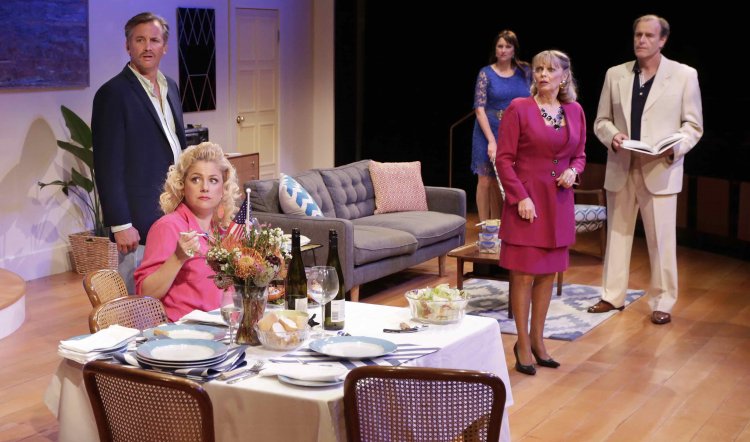
DAYLIGHT SAVING
DAYLIGHT SAVING, Darlinghurst Theatre Company at the Eternity Playhouse, 31 October-30 November 2014. Photography by Helen White: main - Ian Stenlake, Hellen Dallimore, Rachel Gordon, Belinda Goblin and Christopher Stollery; right - Ian Stenlake and Rachel Gordon.
It’s fascinating to be able to see this early play while Miracle City, the Enright-Lambert “un-musical” of 1996, is also on close by at the Hayes Theatre. Back in 1989 Nick Enright was still trying out playwriting ideas and genres and exploring the many facets of his prodigious talent for theatre. So, unlike anything else he’d done to that point, Daylight Saving is a gentle farce with undertones of melancholy as well as hints of Alan Ayckbourn in its structure and plotting.
It also tells us - in its plot and characters - that Enright was aware of David Williamson and as wryly amused an observer of Sydney and its middle class as the taller playwright - whose 1987 “Sydney” comedy Emerald City is currently playing at the Stables. (What does this say about the zeitgeist?)
Happily, rather than any fancy reworking, director Adam Cook has chosen to leave Daylight Saving back in the 80s where and when it was written. This gives it a rosy-tinted wistful glow in costumes, music and decor - in particular the “brick” aka the massive early mobile phone. At the same time however that comical nostalgia is undercut by the same sense that permeates Emerald City: the more things change, the more they stay the same.
Felicity (Rachel Gordon) is a successful restaurateur whose trendy eatery is at Whale Beach, just around the corner from her gorgeous Pittwater home. Its picture perfect water view is the source of the rosy-tinted sunset glow that suffuses the action with upmarket wellbeing; and rather cleverly, also serves to highlight the inner discontent that hangs in the air (set design Hugh O’Connor, lighting Gavan Swift).
Everything should be peachy but because this is the First World, it isn’t. The play opens with Felicity feeling uneasy about a TV interview she thinks went wrong while husband Tom (Christopher Stollery) obliviously tries to get out the door for yet another business trip to LA. The significance of that is the question thrown at her about whether she and her husband are faithful - despite his frequent and well-publicised absences as manager of a world-famous tennis brat.
Felicity fudged her answer and blushed: a moment of self revelation that is heightened when Josh (Ian Stenlake), glossily basted and tanned beau from student days, calls to make contact: he saw it too. And so did her mother, the effervescent, irrepressibly sticky-beaked widow Bunty (Belinda Giblin) who arrives unannounced and impervious as Felicity is preparing oysters and lobster as an impromptu dinner for Josh.
As if Bunty’s eagle-eyed spotting of “the blush” isn’t enough to finely dice Felicity's newly awakened libido, her dinner plans are also crashed by next door neighbour Stephanie (Helen Dallimore). She tucks in to the lobster salad as only a woman in personal crisis could - with gusto.

To complete the disastrous evening, Tom arrives home unexpectedly early with his protege in tow. Jason Strutt (Jacob Warner) channels, via blond-tipped mullet and obnoxious attitude, the young Andre Agassi and his aggro energy and the various comings (there are no goings despite Felicity’s frantic hints) set up the classic scenario of bad timing, wrong assumptions and ruined plans.
The play’s title refers - romantically - to the extra hour together suggested by Josh that actually turns into Felicity’s nightmare. Sunset over Pittwater was never supposed to be the harbinger of this much - or indeed any - bedlam.
Daylight Saving is like one of Felicity’s desserts (tiramisu anyone?) - irresistible and gone in a minute. Rachel Gordon is charged with keeping the show on the ground and on the road while around her Helen Dallimore and Belinda Giblin steal scenes and laughs, Ian Stenlake and Christopher Stollery project smoothly entitled masculinity and perfect timing; and Jacob Warner proves that a Zen diet is no match for testosterone and stratospheric self belief.
In later work Nick Enright went on to explore and dissect his own life and times to great and lasting effect (thanks for the insights John McCallum) before his career and life were so cruelly cut short. Here, however, is a play that demonstrates how the writer and the wide-ranging ideas grew and developed; and how it was possible, back then, for such investigations to happen. Entertaining and enlightening and very well done.
DISCLOSURE: I am the disembodied recorded voice of the mean journalist who interviews Felicity and my brief yet telling contribution is crucial to the play.



-c444x300.jpeg)